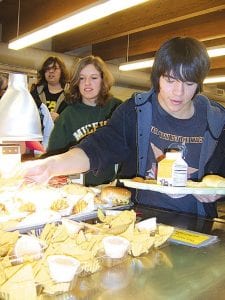How healthy are Cook County school lunches? ISD 166 School Nurse Kristin DeArruda Wharton is using State Health Improvement Program (SHIP) grant funds to make school lunches better.
In a December 14, 2009 memo to the school board, DeArruda Wharton wrote, “Many support people in schools have felt minimized over the years; certainly our food service workers, or ‘lunch ladies,’ are among them. As our nation faces an epidemic of childhood obesity, ‘lunch ladies’ are experiencing their long-deserved recognition as critical players to the health of our children.
“Knowing that many children eat two of their three daily meals at school and more than half of their day’s calories here, school food is a golden opportunity for doing what we do best – educating students!
“…As a nation, our federal school food program is plagued with problems including standards based on outdated research and inadequate funding. And yet, schools across the state and the country are finding creative ways to use our limited resources to exceed federal standards and offer tastier, fresher, healthier foods!”
At the December 21, 2009 school board meeting, DeArruda Wharton laid out the School Health Council’s priorities in improving student nutrition: 1) Providing healthier lunches and ala carte choices; 2) improving the breakfast program; and 3) creating school gardens.
The school food program’s ability to be perceived positively is limited by the resources they have to work with, DeArruda Wharton told the board. She and the School Health Council are trying to figure out how they can financially sustain the changes they intend to initiate.
The SHIP grant will pay for time spent considering new recipes and testing out new ideas, such as a salad bar, to see if they could be popular enough to sustain themselves. It will also seek to educate students on healthy eating.
School board member Rod Wannebo said, “If we think this is important, then we need to find the money or reallocate our resources. …It seems to me this is an important thing for young people.”
We need proof that these initiatives would be effective, said school board member Eric Kemp. They should positively affect academics.
The grant was only awarded for interventions that were already backed up by research, said DeArruda Wharton. Her memo states, “Through a 100-year partnership, school nurses have worked in schools to promote the health of our staff and students. This strong alliance between health care providers and educators lies rooted in the wisdom and science that recognize healthy children as exceptional learners.”
Wannebo said he thought the school should remove its vending machines. Principal Gwen Carman said the vending machines now only have juice, water, and power drinks and are turned off automatically during school hours.
Most nutritious food costs more money, said Kemp, but not all. Pop machines came to schools when pop companies gave schools new things, such as sports equipment, in exchange for letting them put vending machines in the halls, he added.
Some elementary grades have implemented a new school snack program in which parents take turns providing healthy snacks for the whole class, DeArruda Wharton said. They are finding that kids will eat nutritious foods if that’s all that’s put in front of them, she said.
The SHIP grant promotes changes that make healthy choices easy ones to make, DeArruda Wharton wrote. The school’s cooking staff is open to changes that she hopes “will become part of school culture through policies that outlast us as individuals.”



Loading Comments